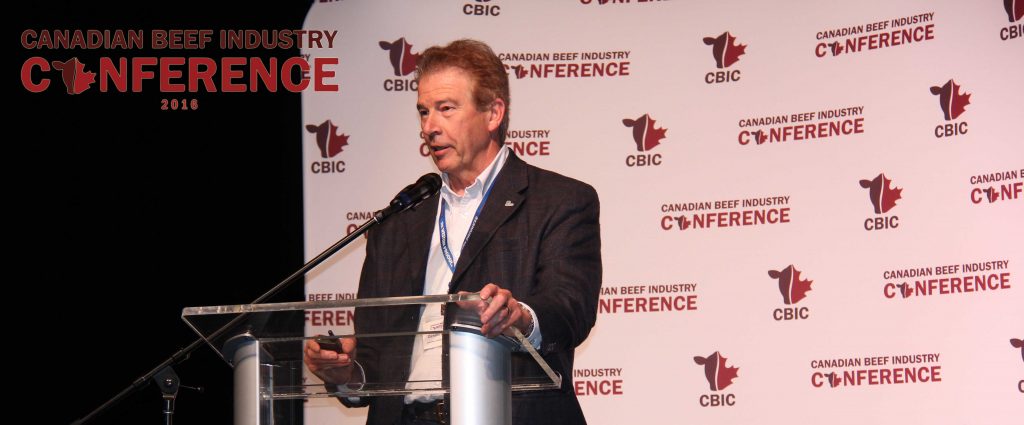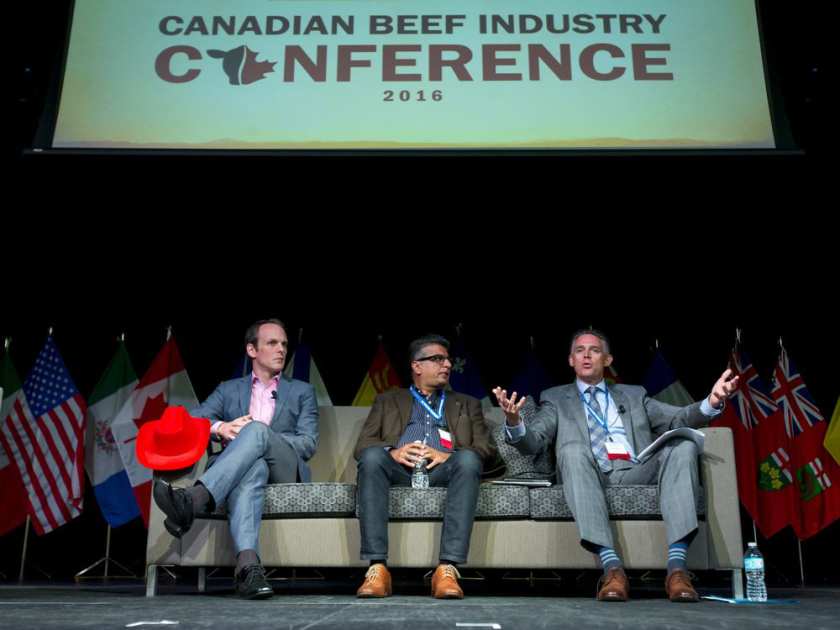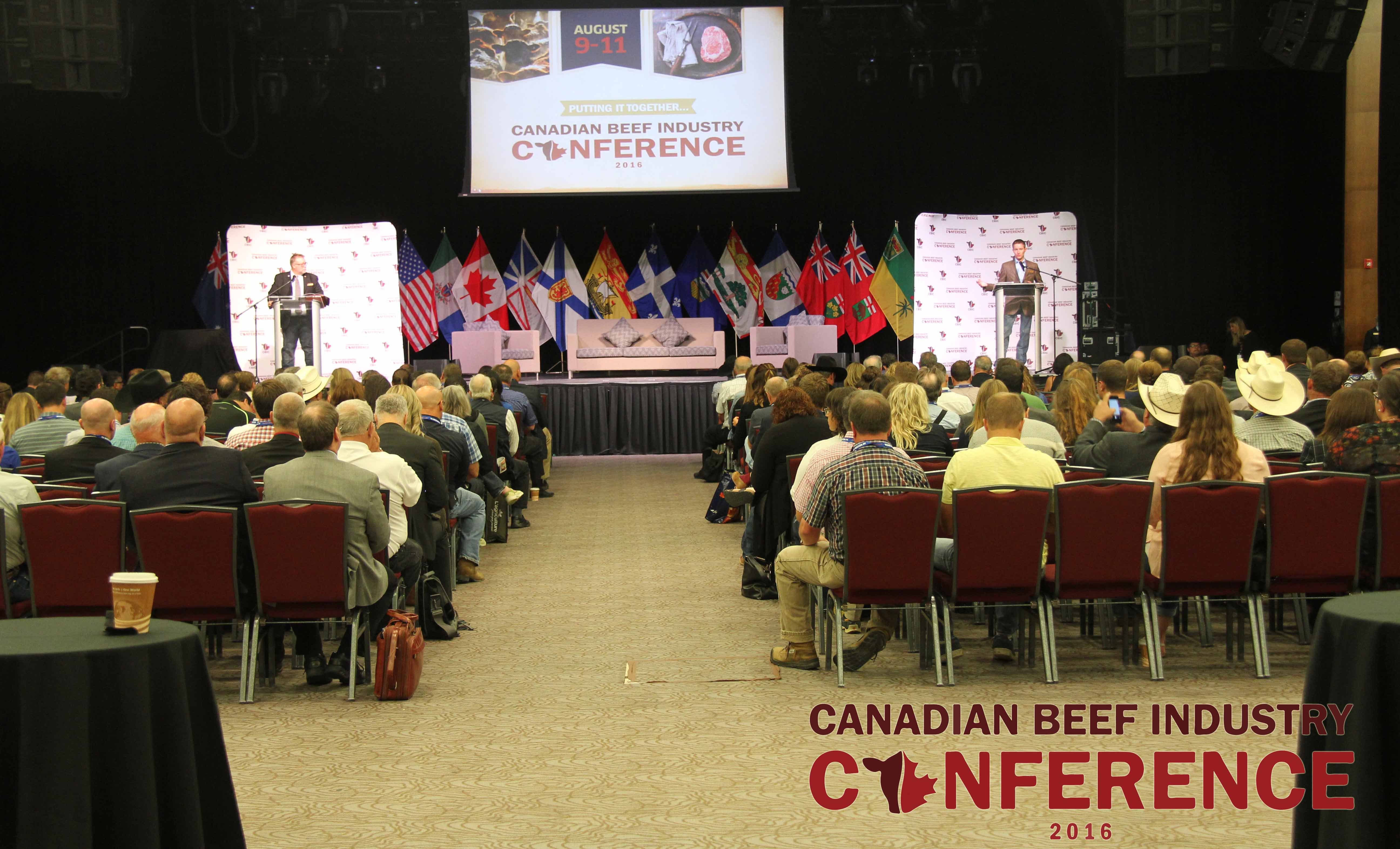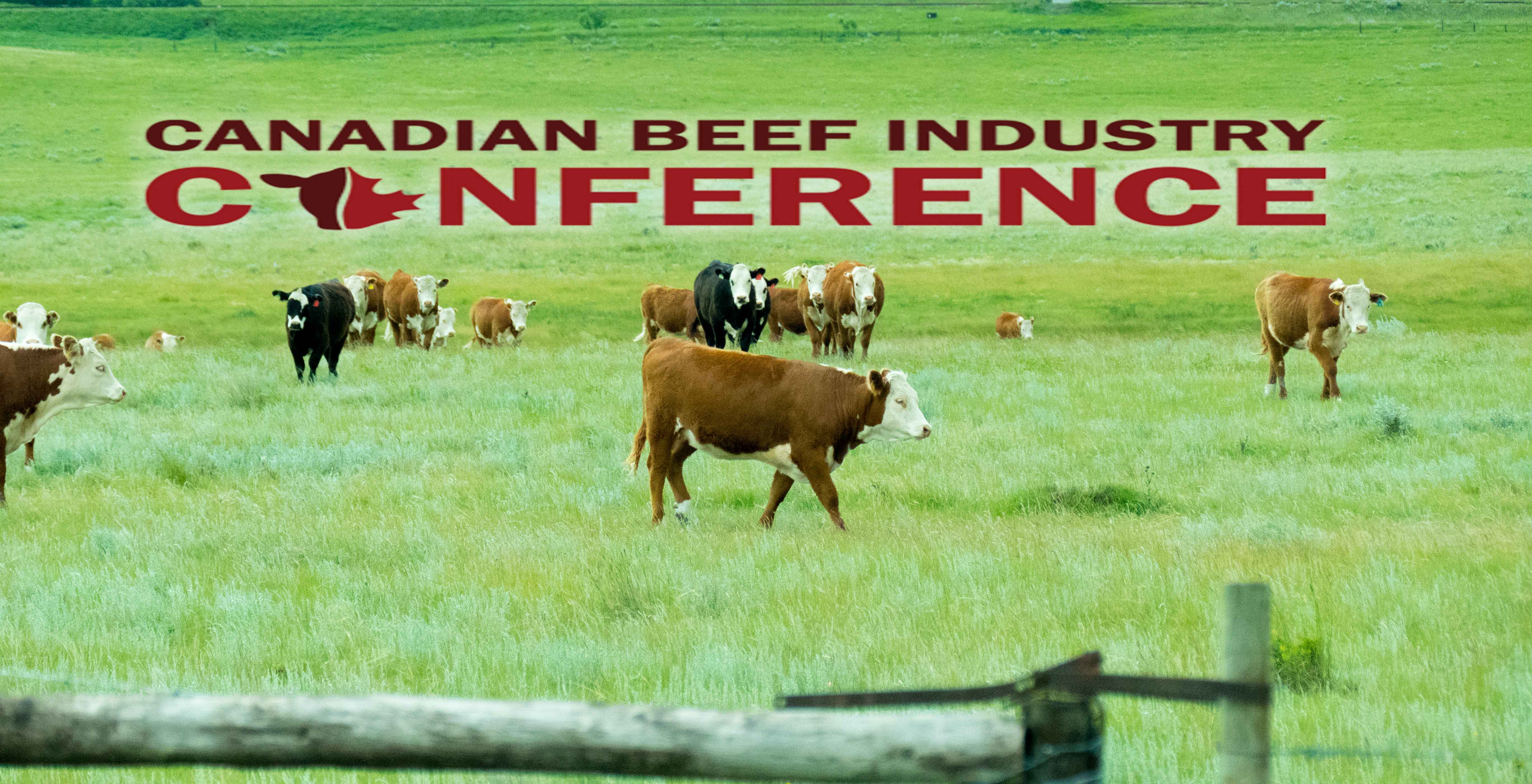Q&A with Dennis Laycraft: The Beef Conference 2016
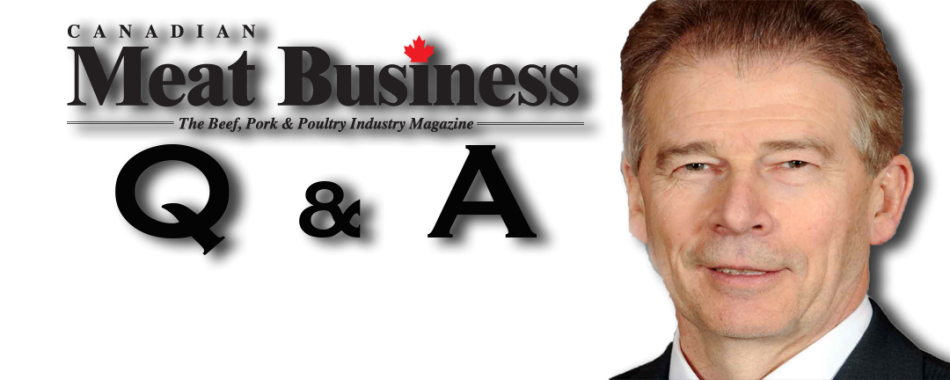
When we had our last Q & A with Canadian Cattlemen’s Association (CCA) Executive Vice President Dennis Laycraft, it was shortly following his November 2015 appointment as the newly elected President of the Global Roundtable for Sustainable Beef (GRSB)
Sept 28 – It was during that conversation that Laycraft had talked about his hopes for the then-upcoming Canadian Beef Industry Conference (CBIC). The CCA was working alongside industry partners in the months prior to the event to ensure the conference would be a success and by all reports, the inaugural event held at the Grey Eagle Resort and Casino in Calgary, AB in August did not disappoint.
The attention the mainstream media was giving the conference was an indication of the importance of this event. There had been big news events leading up to the conference, namely the Brexit vote and its impact on the Canada and European Union Comprehensive Economic and Trade Agreement (CETA) as well as the Earls’ PR controversy.
Canadian Meat Business (CMB) had an opportunity to speak with Laycraft (DL) and get his thoughts and reflections on the CBIC.
CMB: Overall, how was the inaugural conference received?
DL: It was pretty remarkable. You know we had a target of reaching 500 attendees in year one. It was a high expectation especially with organizations like the National Cattlemen’s Beef Association which over many years grew its annual conference from 5,000 to 10,000 attendees, keeping in mind that our industry is about 15% the size of the U.S. industry, so relativity speaking, that would put us around 700 to 800 attendees. I’m pleased to say we hit that milestone. It is one of the larger meetings that has taken place in our industry so yes, I feel really good about that. We also had strong representation of young producers this first year, which also was one of our priorities when we were planning the conference, so that was another milestone for us. It was an interesting demographic that was represented there. Overall, a conference of this size has a lot of moving parts and we had a great team, good balance of presentations and meetings, and actually exceeded our high level of optimism in our first year.
CMB: Safe to say there will be a ‘year two’?
DL: Yes and not only are we looking at next year but were projecting out to year three. After a long discussion we decided next year the CBIC would be held in Calgary again. Even though this year was very encouraging and successful on many levels, next year we have to repeat that, so we thought keeping the same venue would contribute to a successful second event. As we are a national conference, we’ll be looking at Ontario to host for year three.
CMB: Are you considering a major market like Toronto?
DL: Yes. Once you get a conference this large, you have to consider how far out you need to go to provide sufficient accommodations and facilities, so the locale has to handle that as well as be convenient for a lot of producers to fly in or drive to.
CMB: When we spoke a few months ago, you had hoped a number of major meetings and associations within the industry would set their calendar and location to the conference. Along with CCA’s Semi-Annual Meeting, I saw Canada Beef and the National Check-off Agency meetings were also held there this year. It really felt like there was real industry unity going on.
DL: That was the intention. It came out of our pillar of connectivity in the National Beef Strategy. Our thought was that if we’re having all these forums going on like at our AGM, Canada Beef’s Fall Forum, the Alberta Angus Association, our Cattlemen’s Young Leaders program, the Canadian Roundtable for Sustainable Beef, etc., that historically met at different locations and dates, why not coalesce the events because the opportunity for interaction, not to mention the number of their members from each of those organizations that would be in attendance, just makes good sense.
CMB: It appears that everyone jumped on board.
DL: Yes, of course some organizations already had committed their events to a particular date and location. For instance, the Canadian Meat Council was encouraged to have their beef committee meet at the conference but unfortunately that didn’t work out this year but it could happen next year. I’m hoping we will have the Canadian Cattle Identification Agency meeting there as well.
CMB: It would make sense as those organizations would more likely have a better turn out if they scheduled with the conference.
DL: Well, yes, but it would create a lot more moving parts. We’re prepared to plan and accommodate whatever is necessary to facilitate that. You have to keep in mind as well that there is a lot of overlap for many of the members in these organizations, so staging multiple events within one general conference would be saving travel costs throughout the year. We had a lot of discussions regarding the opportunities the conference presents to the industry, not only for the heightened interaction, but creating meeting efficiency and subsequently a lot of connection between all these organizations. And to be honest, unless you’re directly involved, sometimes you’re just not really aware of all the great work and initiatives all these organizations are doing. So yes, coalescing these meetings contributes to better awareness of what we’re all doing for our industry.
CMB: And that translates to unity, which is the goal.
DL: Exactly, yes, but at the end of the day, the success of our conference is still measured by how many active cattle producers register and participate which remains one of our top goals here.
CMB: The award presentations that were held at the conference got some mainstream press.
DL: Yes, they did. The Beef Cattle Research Council hosted their awards and workshops and I was pleased to see that because it appeals to so many producers interested in the new innovations and how they can apply that to their farms. We also had our The Environment Stewardship Award (TESA) presentation which previously had been presented during CCA’s Semi-Annual Meeting. It was great to present that award before 700 people and give all the nominees that kind of recognition, all of whom, speaking candidly, are worthy of winning the award. We need to showcase this very important environmental work that goes on in our industry, yet we know there are many who don’t sign up to be recognized. So, we’re hopeful even more candidates will be encouraged to register for The Environmental Stewardship Award going forward simply because the gala will be held at the Canadian Beef Industry Conference.
CMB: Mo Jessa, Earls’ president, spoke at the conference. How was he received?
DL: He struck me as a very sincere individual. Basically his message was in looking back they just made a dumb decision. Matter of fact, those were his exact words. He acknowledged they didn’t connect as well as they should have with the people that produce their product and that they hurt a lot of people. Subsequently the people that run his establishments were put in a very difficult position. But overall, his message was well received. Everyone is looking forward to working together with Earls’ and other chains. We are in a good place now to not only repair but develop an ongoing relationship that will serve both Earls’ and the industry long into the future.
CMB: Does that mean more verification like Certified Humane?
DL: Yes. There is a lot of remarkable work going on in the industry with respect to that. We have a new module on animal care and verified beef and a feedlot assessment tool that has been developed with a very strong focus on animal care. All of these programs and initiatives are some of the best in the world. Yet chains like Earls’ are, for the most part, simply looking for third party verification because prior there hasn’t been a lot of independent verification in most of cases. Unfortunately, when Earls’ statement went out it did make it sound like we weren’t raising animals humanely.
CMB: It was definitely a public relations mistake.
DL: When you consider our producers and the amount of work and dedication they put in to their animals, I don’t think you could have struck a nerve more directly on than that one and this is an area where Canada really is a global leader. Unfortunately, the statement Earls’ released sent the wrong message out and subsequently did create the impression we’re not. So naturally a lot of people in our industry, and more specifically in Alberta, were hurt by that and took it personally.
CMB: Especially when so much of the industry is effected by the optics.
DL: Yes, our producers trade close to $10 billion worth of cattle on handshakes. And then as you move up the value chain it is a lot more contractor specific. So on one hand it’s remarkable that we’re an industry that has enough integrity and confidence that they’re able to trade on that basis, but that said, there are changing requirements that consumers are looking for and so naturally the industry is looking actively on how we can accommodate that. The bottom line is we will continue to raise cattle the very best way we can.
CMB: There was a media report that came out of the conference that touched on the treatment of the animals. The report indicated the beef industry was resisting customer demands to change the treatment of cattle designated for the food chain. What is your reaction?
DL: I think it comes down to the question of how do you approach consumers with a survey. I’m sure if you asked any consumer, “Do you prefer to have your beef with no antibiotics or hormones in it,” they’re going to say, “Yes, I would prefer that.” The flip side is the practice we have delivers safe beef products and is regarded as one of the best in the world. We follow internationally approved testing procedures that are very sophisticated for any potential residue and we have an exceptionally high compliance rate for safety. So whether you purchase that product from your butcher, from Walmart, Safeway, Earls’, A&W, where ever you go to buy your meat, our commitment is we ensure our beef is safe and wholesome for you. If you want to pay more for some of these market driven claims by these outlets, that’s fine, but we’re committed regardless. Likewise, the same diligence can be said for the practices and procedures we use in producing our beef. Testing can go up to 14 years at least of product and scientific validation before they’re even approved for use. It is an extremely complex and thorough process so for producers it wasn’t as much about resisting the consumer demand but really stating the obvious, in that we are committed to delivering the most wholesome and healthy product we can because we are proud to feed your family just as much as we are proud to feed our own families.
CMB: These issues circle around to sustainability awareness. In your role as president of the Global Roundtable for Sustainable Beef, did you speak this year as well?
DL: Yes. We did a number of things because we’re having the global GRSB conference in Banff this coming October. For that reason, we didn’t slot as much time on that, recognizing that we were going to have a huge forum then, yet we did have a session that was well attended. We had Cameron Bruett from JBS, who is a past president of GRSB, who acknowledged the excellent work being done in Canada. And we’re proud of just how far the Canadian Roundtable of Sustainable Beef has moved in a short period of time, making us one of the leaders in this field.
CMB: The conference did hold a symposium on foreign trade with most concerns voiced over the Brexit vote and what impact our industry could feel from that.
DL: That one has been moving around in terms of the implications. There is some push as a result of the European community who still want to demonstrate they’re an effective trading group, so in that regard I think it’s created a bit more impetus to approve the CETA deal quickly.
CMB: Will it get ratified?
DL: Yes, I believe it will get ratified. The way their process works is the EU will ratify the deal and then it’s up to each of the member countries to ratify it. But it does go into effect the moment the EU ratifies it. So all this time that those countries argue or differ internally, whether they approve it or not, CETA will come into effect.
CMB: What do think will happen with respect to the deal?
DL: I think we’ll see CETA get approved. I think it complicates our issues related to meat hygiene systems. Our sense was the UK was one of our stronger allies on that issue. But it seems to be were going to have to increase our advocacy efforts in Europe to make sure that over the long term we’re able to get some our food safety interventions approved and accepted there. Naturally were not going to turn them off for one market but ultimately the solution is let’s make sure we’ve presented the fact we’ve gone through rigorous testing and utilize one of the best hygiene systems in the world.
CMB: Back to the conference, do you think the number of days for this inaugural event was adequate?DL: It’s definitely on the board for discussion. But right now I think we just need a few weeks to recuperate from this year’s event. I can’t say enough for the amazing work the organizers and volunteers put into our inaugural event this year. Once we get the participant reviews back then we’ll table the question. Of course it may also depend on other agencies and groups that we were hopeful would attend this year but can attend next year.
CMB: In closing, what are some of your final thoughts for this first time event?
DL: I think for a first conference it was really extraordinary. We had a fantastic trade show as well that was really well received. Overall, I feel the conference created an opportunity for every level of our industry, from retailer all the way to seedstock operator, to engage in important dialogue on a wide range of issues. Let’s face it, anytime you’re able to create that opportunity it has to benefit an industry.








